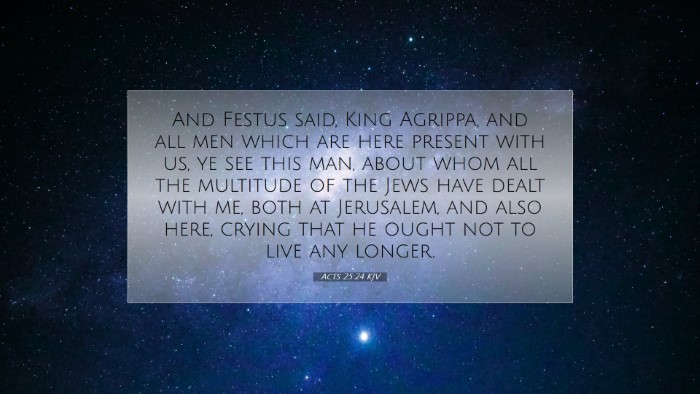Old Testament
Genesis Exodus Leviticus Numbers Deuteronomy Joshua Judges Ruth 1 Samuel 2 Samuel 1 Kings 2 Kings 1 Chronicles 2 Chronicles Ezra Nehemiah Esther Job Psalms Proverbs Ecclesiastes Song of Solomon Isaiah Jeremiah Lamentations Ezekiel Daniel Hosea Joel Amos Obadiah Jonah Micah Nahum Habakkuk Zephaniah Haggai Zechariah MalachiActs 25:24
Acts 25:24 KJV
And Festus said, King Agrippa, and all men which are here present with us, ye see this man, about whom all the multitude of the Jews have dealt with me, both at Jerusalem, and also here, crying that he ought not to live any longer.
Acts 25:24 Bible Commentary
Commentary on Acts 25:24
Verse Context: Acts 25:24 reads: "And Festus said, King Agrippa, and all men which are here present with us, ye see this man, about whom all the multitude of the Jews have dealt with me, both at Jerusalem, and also here, crying that he ought not to live any longer."
Exegesis and Theological Insights
This verse occurs in a context where the Apostle Paul stands trial before Roman authorities. The mention of Festus and King Agrippa sets the stage for a significant moment in the early Church's history. Here, we see the transition of Paul from being persecuted to being a defender of the faith before Jewish authorities and Roman governance.
Historical Context
As noted by Matthew Henry, this passage recounts Paul’s circumstances under the governance of Festus, who had recently assumed the role of procurator of Judea. Henry posits that the political backdrop is essential for understanding the tension between Roman law and Jewish customs, as well as how Paul becomes a pivotal figure in this dynamic.
Analysis of Key Characters
- Festus: The Roman governor who seeks to understand the charges against Paul while trying to maintain order in a volatile province.
- King Agrippa: A member of a royal family with deep ties to Jewish history and customs, Agrippa’s presence implies the ostensible gravity of the situation.
- The Jews: Representing the religious authorities, they vehemently oppose Paul, showing the conflict between early Christian teachings and Jewish tradition.
Commentary from Albert Barnes
Barnes emphasizes the significance of Paul’s testimony and the implications it had for the spread of the Gospel. He points out that while Paul is being accused of death by the Jews, the manner in which he stood trial is reflective of the larger conflict between the emerging Christian faith and established Jewish beliefs. The expressions of the Jewish multitude symbolize their fierce opposition to what they perceived as heresy.
Reflection on Paul’s Situation
According to Adam Clarke, this moment underscores Paul’s integrity and composure amidst adversity. Clarke remarks on Paul’s ability to maintain his dignity and resolve while facing potential death, highlighting his faith in Christ and commitment to the mission entrusted to him. Paul’s trial is more than just a personal matter; it serves as a divine opportunity for the Gospel to reach the highest political influencers of the time.
Theological Implications
This episode in Acts reveals profound truths about the nature of faith, justice, and truth. Below are some theological implications drawn from the text:
- The Sovereignty of God: Each event leading to this trial was orchestrated according to God's divine plan. Despite human opposition, God’s purposes prevail.
- Witness to Authority: Paul’s willingness to present his case before Agrippa invites reflection on the Christian’s role in engaging with political systems, showcasing that faith should engage all aspects of life.
- Persecution and Faithfulness: The persecution Paul faces serves as a testament to his unwavering faith, serving as an encouragement to believers facing their own trials.
Application for Pastors and Theologians
For pastors, this passage serves as a reminder of the importance of defending the faith boldly and articulately. The interactions between Paul and his accusers challenge Christian leaders to ensure they embody the robustness of witness even under pressure.
For theologians and students, Acts 25:24 provides fertile ground for exploring themes of justice, authority, and the nature of truth in the Gospel message as it penetrates cultural and religious divides.
Conclusion
Acts 25:24 is a pivotal verse in understanding the nature of Paul’s ministry and the early Church’s struggles. The interplay between Judaism and early Christianity, the political ramifications, and the courage shown by Paul offer rich insights for contemporary believers as they navigate their faith in the modern world.


